Mockingbird in Davenport Returns With Modern Spin on Ibsen’s “Enemy”
For the second fully staged production at Mockingbird on Main, 320 N. Main St., Davenport, Q-C playwright Alexander Richardson has taken a sprawling 19th-century play by Henrik Ibsen, slimmed it down and modernized it.
The 27-year-old East Moliner – who’s been writing plays for almost a decade – slashed the 1882 “An Enemy of the People” from five acts and 30 characters (stretched across three hours), to just five characters and one act, across about 80 minutes.
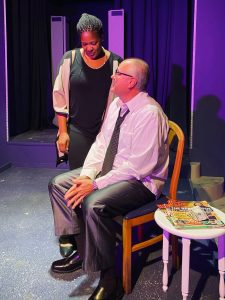
Alisha Hanes and Doug Kutzli in “Enemy of the People.”
In the story, a doctor realizes that the new expansion for his town’s factory is releasing toxins into the town’s water supply. His brother, the mayor, doesn’t believe him and seeks to bury the story. Every character tells us their side of the story as the truth gets blurrier and blurrier.
“I loved the central premise of, the town’s only industry is poisoning that town,” Richardson said this week. “I loved that dynamic of a doctor struggling with the right thing to do and his own family encouraging him to do the wrong thing, which is burying the story. I thought that was such a compelling concept and theme, I wanted to make it work for modern audiences.”
“You just needed a few core characters – because the rest of it is just filler,” he said, noting he greatly expanded the roles of the doctor’s wife and daughter because he thought they had more to say.
At the Mockingbird, Mischa Hooker plays the doctor (Tomas Stockmann); Alisha Hanes is his wife Katherine, Douglas Kutzli is his brother Peter, Jo Vasquez is his daughter Petra, and Ian Heaton is a reporter, Hovstad.
The wife in the original Ibsen disapproved of what her husband was doing, but didn’t have an affair (as she does in the adaptation), Richardson said. In the original, the play ends with a long monologue for the doctor, pissed off at the town, calling everyone at a town hall meeting ignorant and stupid. In retaliation, the townspeople ransack his home.
“The idea I connected with was, what if his wife orchestrated the destruction of his home?” he said. “From there, the character kind of wrote herself. I wanted to give her something more fun to do. The fun was to deconstruct this character and rebuild her anew.”
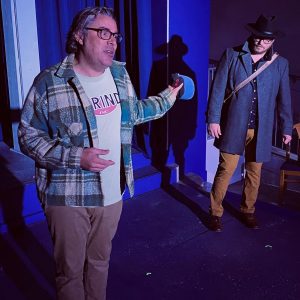
Mischa Hooker plays the doctor in “Enemy of the People” at Mockingbird on Main, opening Thursday night.
The daughter in the original is the most compelling character, with fire and determination, Richardson said. “I didn’t need to change that; I needed to give her more input,” he said.
Ibsen (1828-1906) – a Norwegian whose famous works include “Hedda Gabler” and “A Doll’s House” — originally wrote “Enemy” in response to his controversial “Ghosts,” which Richardson said is a weird play, including incest, adultery and syphilis.
“At the time, everyone was clutching their pearls, and he was so upset people couldn’t get what he was going for that he wrote this play in response, which is where that doctor’s monologue at the end comes in – where he tells the townspeople they’re idiots,” he said. “That was Ibsen working out his issues with his audience – saying, how are you people so stupid? I’m trying to entertain you.”
Themes of “Enemy” address society at large, and frustration with how many people flock behind one person, even if they’re not saying the right thing. “It’s about the urge for the more people that get together, the more they want to cohere as a unit and gang up on other people,” Richardson said.
“His issue was, he wrote this play and everyone was like, you should stop writing plays, this last one was so abysmal. And he was like, you should stop ganging up on me. None of you are thinking for yourselves.”
There’s so much of that today, with politics and social media, and people acting against their own self-interest because that’s what everyone else is doing (e.g., masks and vaccines), he said. “You can’t get more current than that.”
Another main change was the title, originally “An Enemy of the People,” referring to the doctor. Richardson’s is now “Enemy of the People,” meaning anyone could be the enemy.
“The way I’ve restructured the story, every character is at fault in some way,” he said. “What I want the audience to think is, ‘Which one of these people is the enemy of the people?’…I want the audience to put in a little work to decide, who here really is at fault?”
“Every time I see a show, and the impetus is put on me to process what I’ve seen, I love that,” Richardson (who works at Black Hawk College as a senior research analyst) said. In real life, people want things to be black and white, but unfortunately “life has so many more shades of

Playwright Alex Richardson, 27, has written over 10 plays in the past decade.
ambiguity than that,” he noted.
“To me, it feels disingenuous to write stories where one person is at fault and everyone else is ganging up on that person. That’s not how life works,” he said. “Life is unfortunately shades of gray.
When he modernized the play, he wanted to make it timeless.
“Because we are still having these issues, 100-plus years later, so I see no reason to narrow it down to set in 2021,” Richardson said. “We can still tell the story 20 years from now, and I’m sure, I’m positive we’re going to be having the same problems.”
There is political corruption in the play, with the mayor – but “when do we blame political systems, versus the individuals operating the political systems?” the playwright asked. “There’s a lot of compelling questions in the script, and it was a blast to write it.”
The mayor says he’s acting for the benefit of all the people. And there’s another question raised, can people who are sworn to uphold the law really investigate themselves, Richardson said. “Can we believe what they come back and say? There’s a lot of thorny issues.”
In the story, it’s revealed the true corruption in the town and the entire country is that all the power lies with the complacent majority, most of whom are too ignorant to know what’s best for them.
Actress thrilled to be back on stage
Alisha Hanes, a 46-year-old United Township alum who lives in Rock Island, has been acting since she was 5.
“I got into theater because my school system in Moline did mini-theater back in the day, and they encouraged all the kids,” she said, noting she was in her first show in kindergarten and was hooked from then on.
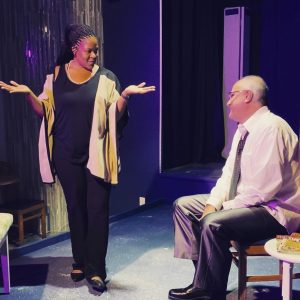
Alisha Hanes and Doug Kutzli in “Enemy of the People.”
Hanes went to Illinois State University and was in a guerilla theater program there, based on social issues. Recently, she was in “The Piano Lesson” at Playcrafters (over the summer) and was in “For Colored Girls” at the Moline theater in 2019. “I just ventured back into theater in 2019, and that was my first local production in adulthood. I hadn’t done theater all these years.”
Hanes has a 28-year-old daughter, Anjelle, who’s expecting her first child in six weeks. Alisha works in logistics for the Joint Munitions Command at Rock Island Arsenal.
Her mother was diagnosed with a terminal illness in 2019 and enjoyed seeing Hanes on stage, and she died 24 days after “For Colored Girls.”
“She really wanted to see that, and she told my daughter, ‘I know she’s going to be OK now’,” Hanes recalled. “I got all excited about theater, and then 2020 came.”
She developed a YouTube channel in September 2020, with mostly inspirational storytelling, personal growth and development. Hanes also participated in local Zoom readings of plays, called “Scenes on Sundays,” where she met Anthony Hendricks, who went on to star in “The Mountaintop,” Mockingbird’s first play this summer, about Martin Luther King, Jr.
“I came here to see him, because I did Scenes on Sundays. There are so many different ways theater people find each other,” she said. “That’s why I really wanted to get back, because theater people are my people. I was able to find them again.”
“The Piano Lesson” was a great experience, doing a famous August Wilson play, and the first mainstage Playcrafters show back during Covid. “That was nice for a lot of people, to come out and see theater again,” Hanes said. “I was glad to be part of that.”
She tried out for “Enemy of the People” because of “The Mountaintop,” which she loved.
“I didn’t know anything about it,” Hanes said. “When something’s new and you don’t know what to expect, I love that. Just being in the audience and let it happen. It was a new theater, I got to meet a new friend I had only met online. I’m just excited to be back and connect with people. I’m crossing my fingers and toes that Covid stays at bay so that we can continue to have live theater.”
“There’s something about live theater that’s just not translated the same through a screen,” she said. “It’s nice to watch something from the comfort of your home, but there’s an energy that you get by watching something live.”
Hanes also was unfamiliar with “Enemy of the People,” and excited to do something different, a new experience.
She also excited to be in such an intimate venue. “It’ll be interesting. It will make people feel more like a voyeur in an experience, versus just watching a live theater. That’s how I felt when I saw ‘The Mountaintop.’ I am hoping that same kind of vibe is translated for other people.”
In the story, she is a wife, mother and an adulteress, having an affair with her husband’s brother. “Her character is the one person who’s in the know, and knows what’s going on across the way,” Hanes said. “She’s the one who has seen it all happening from all sides.”
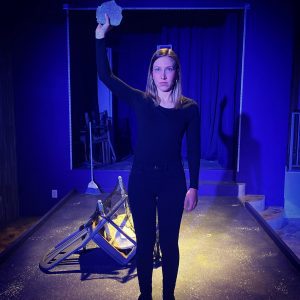
Jo Vasquez in “Enemy of the People” at Mockingbird on Main in downtown Davenport.
“I think as an African-American actress to be cast in a role, it wasn’t like a consideration – this is not a quote ‘Black’ role; it’s just me being a wife and mother,” she said. “I actually think it’s kind of a breakthrough in the Quad-Cities, because often people are just typecast. And this is something where, they need a female actress that’s gonna play this role, and there’s not a reference to it. My daughter is lily-white and I am brown, and it’s never discussed. It just happens and I appreciate that.
“It’s an opportunity to show directors and other people in theater that it’s time for diversity,” Hanes said. “Just let things happen and it’ll be more visually interesting. Things can happen; I am excited about that. I think it’s important we see that, because it helps with future opportunities.”
Her playing this part will ideally encourage other actors of color to try out for any roles, that aren’t just for a Black play. “It encourages people to think outside the box,” Hanes said. “This is going to be an awesome show and people should come see it. Any time you have a new venue and a show that isn’t like a classic, you have to be like, ‘Are people gonna come?’”
The new version is very timely and “makes people think about their own selfishness and greed,” she said. “It makes people think about their place in the world, and corruption. It’s definitely timely and think people will be able to see – even without a direct reference to today, oh yeah, that reminds me of…”
“I’m so excited to be back on stage, and you can be anyone and get into the role, and not be so serious,” Hanes said. Having requirements for masking and vaccination at Mockingbird also is positive to help put audiences at ease, if they’re hesitant to come out, she said. “They can feel like they’re protected here. They’re very vigilant here; there are masks offered at the front desk if you fail to bring one.”
Falling in love with the space
It’s also fun to stage the play in such a small space (40-seat maximum capacity), though Richardson sent Mockingbird owner Tristan Tapscott the script without seeing the theater first.
“I came to see ‘The Mountaintop’ and I just fell in love with the space, because it’s so intimate,” Richardson said. “The script is gonna be so great in here. I didn’t realize how much I would love the space when I sent him the script, but it just worked out better than I could have imagined.”
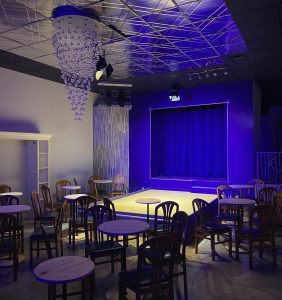
The 40-seat Mockingbird, 320 Main St., Davenport, will require full Covid vaccination or negative tests for entry starting Sept. 1.
The other big change he made in the script was to have characters here address the audience at times, telling the audience their side of the story. “It opens up so many avenues for storytelling if we can give that direct insight into the character’s mind. It was really fun for me to take the central premise of the story and rewrite everything around it, to make it work for modern audiences.”
His works have been produced at several different companies, ranging from originals to adaptations, comedies to dramas, as well as film. His most recent works include “Their Town” and “(a work in progress),” both staged at Playcrafters Barn Theatre, and “Alone” at the QC Theatre Workshop (a half-hour staged reading) as a part of their Susan Glaspell festival.
As devastating as the coronavirus pandemic has been, Richardson said it’s been great for his productivity.
He’s launched a new podcast, Barely There Theatre, where original audio plays (20-60 minutes) are released every month for free. You can subscribe at barelytheretheatre.com/listen.
“Something I love about theater and I don’t think a lot of theaters really strive for is making it accessible for everyone,” Richardson said. “That’s always been the draw of theater, that it’s for the common people.”
“I really just love working with actors and creatives,” he said, noting he also records rehearsals to post on the podcast. “I wanted to give people an insight into what the process is like for these types of things….It’s this is the show you’ve listened to; here’s how we did it. I just love that kind of thing.”
The podcast features all his original plays, and Richardson has been writing more each month. “It also gives me the freedom as an artist,” he said. “If I’m writing it, I get to dictate when it goes up.”
“Anytime I submit a work to a theater, it’s up to them whether to do it in the first place,” Richardson said. “From there, it’s who they staff the show with, when they schedule the show. There’s so many factors that are out of my control at that point – which can be exciting, but also can be terrifying.”
For “Enemy,” he wanted to adapt an older work in the public domain. “Their Town” was more “inspired” by “Our Town,” than an adaptation, he said. It applied the message of the Thornton Wilder classic (“cherish life while you have it”) and set it in modern times, with a new story.
“It’s really kind of the same thing I wanted to do with this script,” Richardson said of the Ibsen. “With this one, I wanted to keep the characters and close to the plot of the original.”
“I’ve been very fortunate to get my work in a couple different theaters now,” he said. “It’s hard to get my work done.” Most theaters prefer well-known, established shows, to maximize their revenue.
The Playcrafters Barn Owl series is tailor-made for him, especially since he launched it originally in 2017. “I wanted an excuse to do more modern works, that for whatever reason the Q-C doesn’t like connecting with,” Richardson said. “With the Barn Owls, we found a steady audience, but it’s a small audience. There is an audience in the Q-C for new works.”
“They’re still doing it today, which means that it’s been successful,” he said of Barn Owl shows. The only one of his they’ve done was “Their Town,” which closed in March 2020, the day before Covid shut down everything. “You couldn’t have asked for better timing in that sense.”
Richardson’s “(a work in progress”) was done for Playcrafters main season in 2019. He’s spent so much time at Playcrafters over the years (including directing often), so he’s taking s break from that theater.
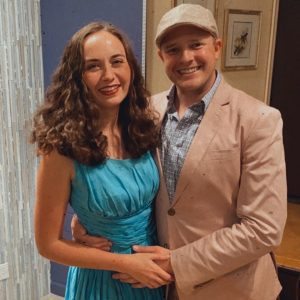
Mockingbird owners and producers Savannah Bay Strandin and Tristan Tapscott.
After doing theater for over 20 years, Victoria House is a first-time director with “Enemy.” She’s had great experience working with Richardson and Tapscott on many other shows.
“If I was going to give directing a shot, I couldn’t ask for better backing crew,” she said. “And the cast I have is just incredible.”
“Especially with something like this, that’s adapted, it’s nice to him handy and around,” House said of Richardson. “We just make sure everyone is on the same page.”
“I think it’s really relevant today; it deals so much with moral relatively,” she said of the play. “How is your reasoning for something any less valid than anyone else’s?”
In the story, there’s a definite question about who the villain is, House said. “The characters are done in such a realistic manner that they have something that we as adults and human beings, especially in our society now, can relate to.”
She also loves the small Mockingbird space, evoking some of her past experience with black-box theaters. “It really feels like getting to a black-box theater, a storefront theater. It feels like home,” House said.
There is a bar scene in “Enemy,” and everyone in the audience will feel part of the bar, she noted. “The same when we have characters come in and out of the house. I’ve always enjoyed it; I hope my actors enjoy it. I think it adds something to it. It makes the connection stronger – I’ve always been of the mindset that theater is not a passive experience.”
“Enemy of the People” will be performed at 8 p.m. Thursday through Saturday, Sept. 30-Oct. 2 and Oct. 7-9. Tickets are $15, available HERE.
Mockingbird On Main will require all guests, artists, volunteers, staff, sponsors, and media to show valid proof of full vaccination in order to enter. Proof of vaccination may be digital or a physical card. Additionally, all patrons must wear a mask while inside the theater.
Children under 12 and unvaccinated patrons must provide proof of a negative Covid test no more than 72 hours prior to attending an indoor performance.









